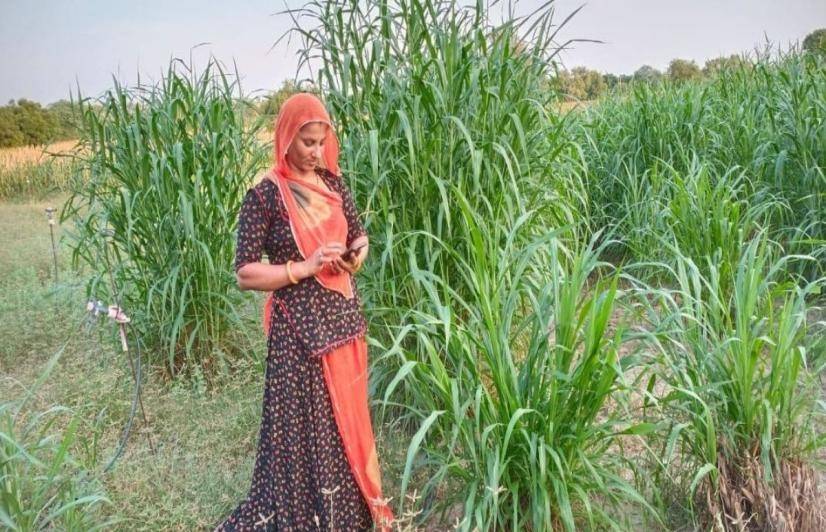Initially, while digging out the carrots, I noticed the long, thin and crooked ones. When I realised that the market-bought seeds didn’t seem right, I prepared them myself to fix the problem.”…reports S R Pareek
Women in rural Rajasthan are leading the way in building innovative solutions in agriculture. They currently helm around 20 government-approved startups in the state in this field-five in organic farming, two in dairy and 13 in other agro-based industries. This is in keeping with the momentum across the country, wherein women lead 173 agricultural startups.
“In collaboration with the NITI Aayog last year, 150 female entrepreneurs from Rajasthan were involved in a brainstorming session to discuss startups,” said Tapan Kumar Sharma, joint director of the Department of Information and Technology, Jaipur.
“Besides training, the startups receive seed funding from the government along with a sustainability and marketing allowance. This figure is expected to rise gradually.”
Honey-sweet carrots and the President’s Award
Santosh Pachar, a resident of Jhigar Badi village in Rajasthan’s Sikar district, may have studied only till class VIII, but she’s received the President’s Award twice (in 2013 and 2017) for her innovation with carrot seeds. Pachar, who owns around of 30 bighas of farmland, started advanced organic farming in 2002.
“At first, I didn’t know what an agricultural officer was, but once I began attending agricultural fairs, I learned a lot from them,” said Pachar, the only female farmer from Rajasthan to participate in a 15-day training seminar for progressive farmers at the Rashtrapati Bhavan.
“Initially, while digging out the carrots, I noticed the long, thin and crooked ones. When I realised that the market-bought seeds didn’t seem right, I prepared them myself to fix the problem.”
Pachar developed a new pollination technique by mixing 15 ml of honey and 5 ml of ghee with 1 kg of carrot seeds and drying them in the shade. The seeds germinated quickly, and with minimal spoilage, it took 75 days to yield carrots 1.5 to 2.5 ft in length. Pachar had not only enhanced the sweetness of the carrots by 5 per cent, but had also amplified production by one-and-a half to two times. As a result, she received a reward of Rs 3 lakh and a citation from former president Pranab Mukherjee.
There’re more: Pachar also installed a cow dung gas plant using indigenous technology, benefiting 20 houses in her village. She further helps other women by imparting knowledge of innovations in farming.
From the desert areas of Rajasthan to the tribal belt, women aren’t just participating in the agriculture sector but also doing well for themselves. Speaking to 101reporters, Jayesh Joshi, Secretary of the Vagdhara Sansthan, said: “There are 3.60 crore women involved in agricultural work. Women are promoting organic farming, and community-based activities are raising awareness to take this further and see the launch of more startups. Many women are also employed in the food processing sector. In the tribal area of Banswara, we’ve developed nurseries that are run by women.”
Taking over orchards
Santosh Khedar, also from Sikar district, is a master in pomegranate cultivation. It all started when her husband worked as a home guard and saw a pomegranate tree while on duty. He got the idea of planting a pomegranate garden and shared it with his wife, who readily agreed. She managed to collect money from various sources to install a tubewell in her garden and spent three years irrigating it until her first yield of pomegranate.
“I did not know how much money I’d get, but eventually, the hard work paid off and I doubled our income,” Khedar proudly told 101Reporters.
“We made a profit of Rs 3 lakh, which we used to first pay our loans, before planting new crops. We also began planting lemon, guava and apple saplings in the empty spaces between the pomegranate trees. The experiment was successful and our profits crossed Rs 10 lakh annually.”
Today, Khedar also runs a nursery, selling pomegranate, lemon, apple, Kinnow oranges and mango saplings to other farmers. Through horticulture, the family now earns an annual income of Rs 25 to 30 lakh.
Interestingly, both Prachar and Khedar’s husbands were involved in traditional farming earlier. Their earnings, however, were meagre in comparison, with crops often failing and leading to mounting debts.
Dates flourish on the sandy banks of Barmer
In Barmer, the Elchi Bishnoi tribe is familiar to such success stories, albeit with the production of dates. Here, they not only grow dates on the sandy banks of Barmer, but also process and sell them. While date palms were not cultivated in the region earlier, the women of Sedwa tehsil started the trend by planting a thousand saplings and increasing their annual income from farming from Rs 60,000 to Rs 6-7 lakh.
Highlighting the support the state extends to rural women, agricultural scientist Pradeep Pagaria told 101Reporters: “People of the Elchi Bishnoi tribe are cultivating and processing dates in the sandy gorges of Barmer. Phoolkanwar, the sarpanch of Nadol in Pali district, is engaged in making the women here self-sufficient, helping them cultivate lemons on 20 bighas of land. We impart training to them through the Krishi Vigyan Kendra. We educate women on the various types of farming, on what crops to cultivate, how to use seeds and so on. We also show them various techniques in the fields.”
B.R. Choudhary, vice chancellor of Jodhpur’s Agricultural University, said: “There are many examples of progressive female farmers from Barmer, Sirohi, Pali and Nagaur. Women here are doing exceptionally well in agricultural startups with the help of technology. Although in the early stages, they are forging ahead, which is a good sign. They are given regular training in farming techniques, animal husbandry, dairy and other agro-based work.”
(The author is a Jodhpur-based freelance journalist and a member of 101Reporters, a pan-India network of grassroots reporters.)
ALSO READ-An inspiring success story in mushroom cultivation

Leave a Reply